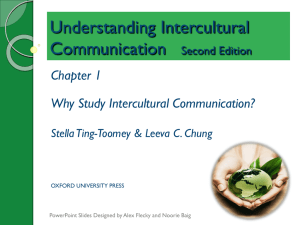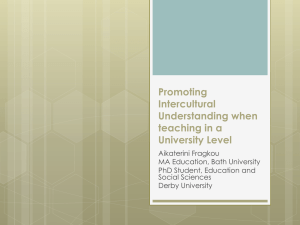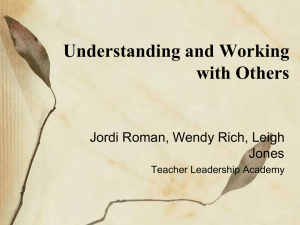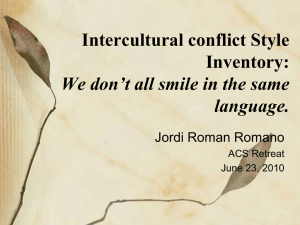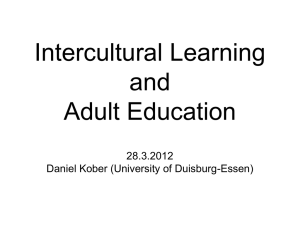Humanities 105 Syllabus - Seattle Central College
advertisement
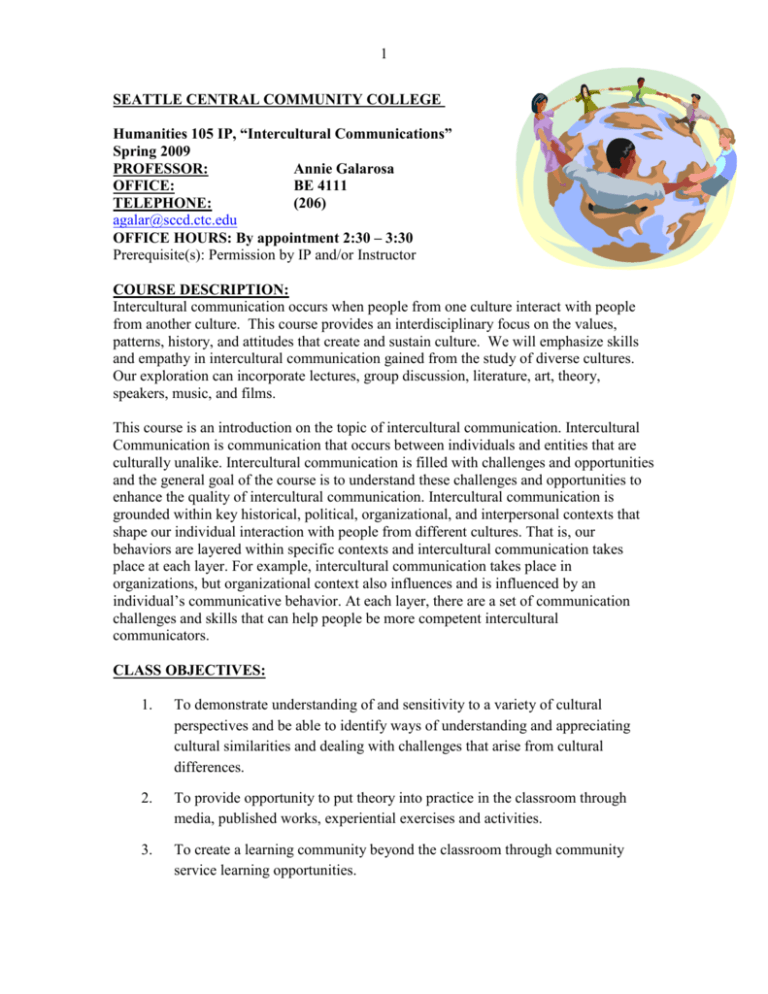
1 SEATTLE CENTRAL COMMUNITY COLLEGE Humanities 105 IP, “Intercultural Communications” Spring 2009 PROFESSOR: Annie Galarosa OFFICE: BE 4111 TELEPHONE: (206) agalar@sccd.ctc.edu OFFICE HOURS: By appointment 2:30 – 3:30 Prerequisite(s): Permission by IP and/or Instructor COURSE DESCRIPTION: Intercultural communication occurs when people from one culture interact with people from another culture. This course provides an interdisciplinary focus on the values, patterns, history, and attitudes that create and sustain culture. We will emphasize skills and empathy in intercultural communication gained from the study of diverse cultures. Our exploration can incorporate lectures, group discussion, literature, art, theory, speakers, music, and films. This course is an introduction on the topic of intercultural communication. Intercultural Communication is communication that occurs between individuals and entities that are culturally unalike. Intercultural communication is filled with challenges and opportunities and the general goal of the course is to understand these challenges and opportunities to enhance the quality of intercultural communication. Intercultural communication is grounded within key historical, political, organizational, and interpersonal contexts that shape our individual interaction with people from different cultures. That is, our behaviors are layered within specific contexts and intercultural communication takes place at each layer. For example, intercultural communication takes place in organizations, but organizational context also influences and is influenced by an individual’s communicative behavior. At each layer, there are a set of communication challenges and skills that can help people be more competent intercultural communicators. CLASS OBJECTIVES: 1. To demonstrate understanding of and sensitivity to a variety of cultural perspectives and be able to identify ways of understanding and appreciating cultural similarities and dealing with challenges that arise from cultural differences. 2. To provide opportunity to put theory into practice in the classroom through media, published works, experiential exercises and activities. 3. To create a learning community beyond the classroom through community service learning opportunities. 2 Learning Outcomes: Students will be able to 1. Deliver an appropriate, culturally sensitive presentation related to cultural issues and values. 2. Demonstrate and apply the process of selecting, organizing, and delivering a presentation. 3. Be an effective, mindful, and self reflective communicator across cultures while contextualizing one’s own culture. 4. Analyze and examine through writing and discussion, multicultural relationships in the United States, such as race/ethnicity, class, socio-economic status, religion and gender. 5. Describe and connect historical foundations to contemporary multicultural issues and values. 6. Acquire knowledge and skills at various layers that increase intercultural communication competence. 7. Identify barriers—racism, sexism, and systems of privilege—that arise from histories of colonization, exploitation, and discrimination, and learn ways to creatively address these inequities. 8. Gain a critical perspective on local/global issues by examining the historical and political dimensions of intercultural relations. COURSE MATERIALS: Required: 1. Intercultural Communication: A Layered Approach by John G. Oetzel 2. Dreams From My Father by Barack H. Obama COURSE REQUIREMENTS: Class sessions will consist of mini-lectures, films, guest speakers, large and small group discussions, class exercises and activities and debriefings around the topics and activities. The purpose of the groups is to share ideas to help one another learn (e.g. talking about a reading or lecture). Attendance and full participation is mandatory. The majority of the required reading and writing assignments must be completed prior to each class session. 1. Self-discovery learning journal. This is a one to two page self-reflection essay due every week. There will a total of 10 journal entries, Due on the Monday following the previous week beginning with the second week of the quarter. 2. Weekly chapter readings and small group seminar presentations and/or pop quiz on the chapter readings and related materials such as films and additional articles as assigned. 3. Two major writings. 4. Midterm and Final Self Evaluation. 3 5. Service Learning “Service-learning is both a philosophy of education and a learning method. It is a type of experiential learning that engages you in a direct service within the community in a way that supports the learning goals of the course.” Your experience with service learning will help you better understand the concepts and theories in the course. You can earn two extra credits with Service Learning; this part is optional. This requires an additional commitment of 16-20 hours of community service over the course of the quarter. If you do not want to pay for the additional credits, you may have servicelearning noted on the bottom of your transcript. The orientation for Service Learning will take place the second week of the quarter. For more information, go to the following website: http://seattlecentral.edu/service-learning/ For a list of the pre-approved SL agencies go to my course webpage. GRADING: (see separate Grading sheet!) Procedures for appealing exam/paper scores: I will go over exams and papers in class. This time is not for debating scores; it is a time for understanding the exam questions and answers. If you believe your grade is incorrect and would like to appeal the score, you have two choices: (1) write out the appeal, carefully explaining why you feel you deserve more points and I will notify you of my decision in writing within 2 days or so, and/or (2) make an appointment to discuss the issue in my office. The first appointment will be 24 hours after the exam/paper is turned back to you. I will accept late papers for one week after the due date with a pre-10% penalty deduction. Assignments are due at the beginning of class unless otherwise noted. For every day late, I will deduct 5% off of the total points as a penalty. Makeup examinations are only allowed if you make special arrangements with me BEFORE the exam date (or under extreme cases such as a family emergency). CLASS PARTICIPATION AND ATTENDANCE: Attendance and class participation are an integral part of the learning process. Class participation enables you to demonstrate your knowledge of the material, and to express what you think. It shows me that you have read and reflected on the subject, and it allows all of us to share perspectives that might otherwise remain hidden. Participation includes attendance (on time), paying attention (e.g. not falling asleep), note-taking, and discussion of the course content with other classmates in small and large group settings. A three day grace period for absences is allowed before losing any points; thereafter each day of absences or a series of tardiness or early exiting will result in a loss of points towards attendance/participation. Specifically, I will take attendance throughout the quarter and for every absence over the 3 grace day allowed (excused or unexcused) will result in a deduction of 3 points from your overall grade. 4 Withdrawal: If you are no longer planning to continue the class, you must take the responsibility to officially withdraw from this class. May 29 is the last day to withdraw with instructor’s signature. If you do not withdraw, or sign up for an exit interview you can expect a “0.0” in the class. INSTRUCTOR’S EDUCATIONAL PHILISOPHY: We will read, discuss/debate and write to not only improve our critical thinking, reading, writing and oral skills but to develop our independent and collaborative learning skills. To study any subject well, there must be commitments by all to actively engage in the learning process. Student Responsibilities: contribute to the development of a learning community by reading the required reading assignments in a timely manner attending and participating in classroom activities taking notes responding with an open and inquiring mind improving on one’s written and oral skills by applying corrections made on your written work. allocating time out of class for daily preparation and reflection. I will expect you to take an active role in your learning. If you are having trouble, you need to come see me. I am very happy to help you out--that is what I am here for. I am willing to work with you until you completely understand. Please take advantage of my services. Please do not be afraid to come see me. Further, if you do not understand something, I will expect you to ask questions. I give ample opportunity to ask questions. I will often say, “Are there any questions?” If there is no response, I assume everyone understands. If you are embarrassed to speak up in front of the class, come and talk to me after class or in my office. The instructor is not “all-knowing” with fixed and immutable knowledge and information. Knowledge and information are mutable and can be created, beginning with the student’s interests. Activities are student centered (rather than instructor centered) that will help you reflect upon your own experiences. This method is used to help promote active learning since learning beyond reading is ultimately a social experience. Finally, the individual is often the most important source of knowledge. Each of you is your own best authority on your perceptions, reactions, emotions and experiences. However, your personal knowledge should be checked and verified against other criteria such as research sources. The check includes the perceptions of others and the legacy and patterns of the past. In conclusion, this attempt at education is to actively involve the student through as many different methods as possible within a social environment. 5 At the end of the quarter, you will be faced with the greatest challenge of all; and that is to continue this work of inquiry; to go far beyond what you have learned and apply it to a lifelong commitment to learning. This includes a commitment to share your knowledge and efforts with others. (Each one, teach one). AMERICAN DISABILITY ACT: If you need course adaptation or accommodation because of a disability; if you have emergency medical information to share with your instructor, or if you need special arrangements in case the building must be evacuated; please make an appointment with your instructor as soon as possible, and also the Disabilities Support Services Office. REMINDER: Please turn off cell phones and other electronic devices while in class. A five point penalty will be enforced after the 1rst warning due to a cell phone going off during class time. Eating and drinking is not allowed in the classroom. “To better understand the world around you and achieve a rewarding life” - Master Bruce Lee, aka “Little Dragon” 03/24/2009



